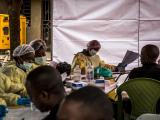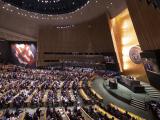The world underestimates the risk of a health threat worse than Ebola, and its capacity to prepare and respond is "woefully insufficient," according to a high-level panel appointed by United Nations (UN) Secretary-General Ban Ki-moon to look at improvements based on lessons learned during the recent outbreak.
The scope of West Africa's Ebola outbreak in September 2014 led to the UN's first-ever special mission to address a public health crisis. Appointed in April 2015, the six-member group was led by Tanzanian President Jakaya Mrisho Kikwete.
Before making its findings and recommendations, the full panel met six times last year and held six roundtable meetings. The group’s unedited, 95-page advance report, dated Jan 25, is posted on the United Nations' Web site.
In the foreword to the report, the panel emphasized that its review isn't a critique of the Ebola response, but rather a wake-up call that comes with a set of critical recommendations designed to improve the global response to the next crisis.
Developed nations won't be spared
The authors noted that recent outbreaks of 2009 H1N1, H5N1, SARS (severe acute respiratory syndrome), and Middle East respiratory syndrome coronavirus (MERS-CoV) show that emerging diseases can be a challenge even for sophisticated healthcare systems in developed countries.
Based on what it learned during its fact-finding, the panel said the emergence of a highly pathogenic flu strain that could kill millions isn't an unlikely scenario. It noted that because Ebola is transmitted by infected body fluids, though devastating, it would be easier to contain than an airborne disease such as pandemic flu.
"The greatest concern is the emergence of a virulent strain of a highly communicable pathogen—such as influenza virus—that could result in millions of deaths," the report says, noting that the impact could far outweigh the 1918 flu pandemic.
Call for emergency response center
To avert the devastating toll of a future pandemic, the authors made 27 recommendations, including several that cut across different governance levels and require input and action from all sectors of society.
However, they recommended three top-priority steps that can be taken immediately and require global cooperation. The first is creation by the World Health Organization (WHO) of a new "Centre for Emergency Preparedness and Response" that has real command and control capacity and can access the personnel and resources it needs to respond.
Also, countries should meet their required International Health Regulations capacities, and those that aren't able should receive global support to implement them, the panel advised. The third key recommendation covers financing in three areas: helping countries meet their IHR obligations, funding the proposed new WHO emergency center, and supporting the research and development of vaccines, drugs, and diagnostics.
To oversee progress in meeting the recommended measures and implementing reforms, the group proposed that the United Nations establish a high-level council on global health crises within its General Assembly and help prepare to convene a summit meeting on such crises in 2018.
See also:
Jan 25 UN high-level panel report on global response to health crises



















